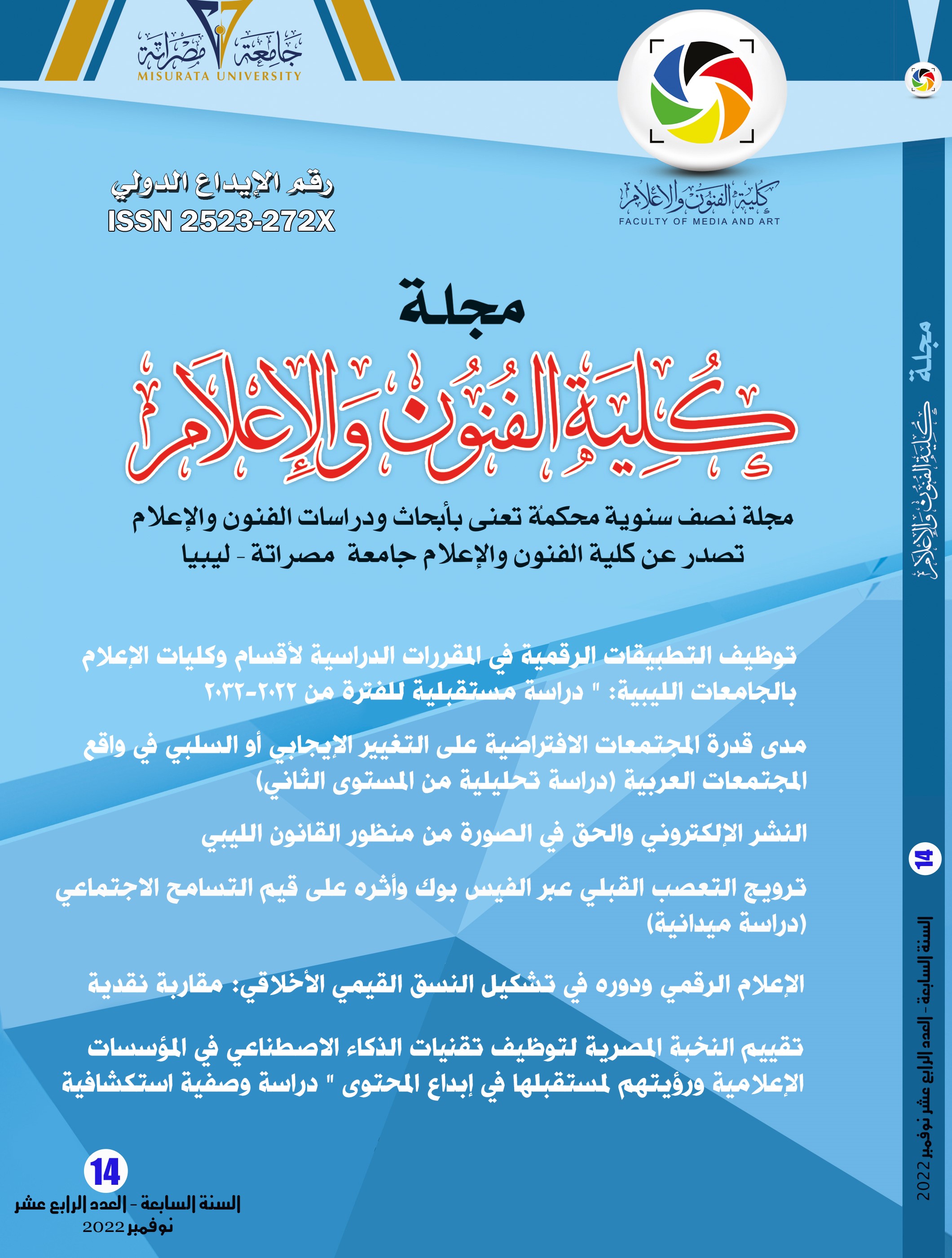The role of social networking sites in the political upbringing of Libyan university students: A field study on Facebook users from Sirte University students - a model.
DOI:
https://doi.org/10.36602/famj.2022.14.10Keywords:
social networking sites, political upbringing, Libyan university students, FacebookAbstract
The current study aimed to measure the positive and negative role of social networking sites in the process of political upbringing for Libyan university students, since the media, especially digital media, which is considered (social networking sites), is one of the most important patterns; It is one of the channels of political upbringing, which in turn is considered a tool on which the political system, with its formal and informal institutions, depends on changing, modifying and instilling new values and beliefs in the political culture of society in general. This study will depend on users of Facebook, which is the most widely used social networking site And spread among the youth category in Libya (as proven by previous studies), especially university students, and this study relied on the students of the University of Sirte who used Facebook as a case study, in polling their opinions and attitudes, about the role of Facebook in achieving political upbringing on the negative side And the positive, by focusing on three topics of importance to the political culture of university students in Libya, as the researcher believes: citizenship values, constitutional culture, political participation, and political knowledge. This study will depend on the survey method in surveying the attitudes of the students of the University of Sirte, through the questionnaire tool, for a deliberate sample of (125) individual Facebook users from the students of the University of Sirte.
The study reached a set of results, the most important of which are:
- The general results of the study showed that there is a positive role for Facebook towards political participation, in pushing them to obtain an electoral card, to participate in the elections. Facebook in making them object to the policies and decisions of the government that they like, and a negative role in the contribution of Facebook sites in boycotting electoral processes as a means of delivering corrupt politicians and unqualified to power, that Facebook presents an image of non-affiliation to political parties and membership of community organizations as a tool for dividing society and planting Sedition and the implementation of a foreign agenda.
- That there was a positive role for Facebook in pushing towards strengthening the Libyan national identity, by opening horizons for dialogue between the components of the Libyan society, including Arabs, Tebu, Toures and Berbers, and it contributed to strengthening feelings of belonging such as pride in the common history, the symbols of Libyan jihad, and the language and religion, and there is a negative role for Facebook, which is limited to that it contributes to skepticism and division about national symbols and the common Libyan national history, and that Facebook promotes primary affiliations, such as tribe, race, and city, at the expense of national affiliation.
- The general results showed that the majority of the study sample, that there is a positive role in the direction of consolidating the constitutional culture: Facebook is represented in raising their awareness of the importance of having a constitution for the State of Libya that guarantees their rights and defines their duties. It guarantees the rights of Libyans, and keeps them as a social contract that guarantees their rights and achieves justice and equality among them regardless of their affiliations. As for the negative role of Facebook sites in that it presents the constitution as containing ideas imported from the West in the name of democracy that contradict the Libyan religion, customs and traditions, as well as what is going on on Facebook about drafting a constitution in Libya is an attempt to favor one Libyan party over another by giving it rights that make it in the center higher than the other
References
. الوحيشي، علي محمد مصباح. (2015). دور الاعلام الجديد في التنشئة السياسية، دعم ثقافة المواطنة، ترسيخ الثقافة الدستورية، ليبيا: مجلة علوم الانسان والمجتمع، العدد16. 2.
2- خشيم، مصطفى عبد الله، المغيربي، محمد زاهي. (1990). التنشئة السياسية: دراسة تحليله، ط1، بنغازي: منشورات جامعة بنغازي. 57.
3- القصبي، عبد الغفار رشاد. (2006). التطور السياسي والتحول الديمقراطي، ط2، القاهرة: جامعة القاهرة. 206.
4- مشاقبة، عاهد، وآخرون. (2016). دور مواقع التواصل الاجتماعي في تشكيل الوعي السياسي: دراسة تطبيقية على طلبة ال البيت، فلسطين: المنارة، المجلد 22، عدد 4/ب. 1.
5- إطبيقة، عبد الله محمد عبد الله، عبدالحفيظ، عبد العزيز عقيلة. (2020). اعتماد طلاب جامعة سرت على وسائل الاعلام الجديد في تشكيل اتجاهاتهم السياسية: دراسة ميدانية، ترهونة: عدد 7. 62.
6- العبيدي، امال سليمان محمود. (2019). التنشئة السياسية والهوية الوطنية في ليبيا: في الهوية الليبية: الابعاد والمقومات، بنغازي: مركز دراسات القانون والمجتمع. 219.
7- بن حغاف، ساره. (2016). حرية الراي والتعبير في مواقع التواصل الاجتماعي: دراسة حالة الجزائر، رسالة ماجستير غير منشورة.33.
8- حسن، عمر جمال أـبراهيم. (2021). مواقع التواصل الاجتماعي: المفهوم والاهمية، قنا: مجلة كلية الآداب بقنا. العدد52. 777.
9- كريم، عبير. (2021). دور مواقع التواصل الاجتماعي في اشاعة خطاب التحريض والعنف في العراق: دراسة مسحية لجمهور مدينة بغداد، رسالة ماجستير غير منشورة، قسم الصحافة، كلية الاعلام، جامعة بغداد. 22.
10- زعرور، زين الدين، بن يحي، سهام. (2020). دور مواقع التواصل الاجتماعي في نشر الوعي البيئي لدى الطلبة الجامعيين في الجزائر: الفايسبوك نموذجا، الجزائر: رسالة ماجستير غير منشورة، كلية العلوم الانسانية والاجتماعية. 26.
11- الشرافي، رامي حسين حسني. (2012). دور الاعلام التفاعلي في تشكيل الثقافة السياسية لدى الشباب الفلسطيني: دراسة ميدانية على طلبة الجامعات في قطاع غزة، غزة: رسالة ماجستير غير منشورة. 43-53.
12- محيه، عبد الحكيم، حنون، نزهة. (2018). استخدام مواقع التواصل الاجتماعي وانعكاساته على الهوية الثقافية لدى الشباب الجزائري: دراسة ميدانية على شباب مدينة أم البواقي، رسالة ماجستير غير منشورة، كلية العلوم الاجتماعية والانسانية. 44- 46.
13- السيد، جاب الله السيد. (1997). أساليب الاتصال والتنشئة السياسية تحليل سوسيولوجي لدور الصحافة الاقليمية في التنشئة السياسية في المجتمع المحلي، طناطا: المجلة العلمية بكلية الآداب، العدد 10. 221.
14- بلمولاي، بدرالدين. (2017). دور الاعلام في التنشئة والممارسة السياسية، الجزائر: مجلة العلوم الانسانية والاجتماعية، العدد 29. 8.
15- حرير، عبد المنعم عبد الغني. (2011). دور وسائل الإعلام في تشكيل الثقافة السياسية لدي الشباب الليبي: دراسة حالة الإذاعة المرئية لعام 2009، بنغازي: رسالة ماجستير غير منشورة، قسم العلوم السياسية – أكاديمية الدراسات العليا بنغازي. 6.











